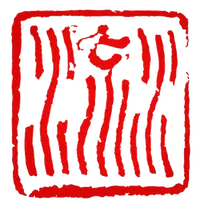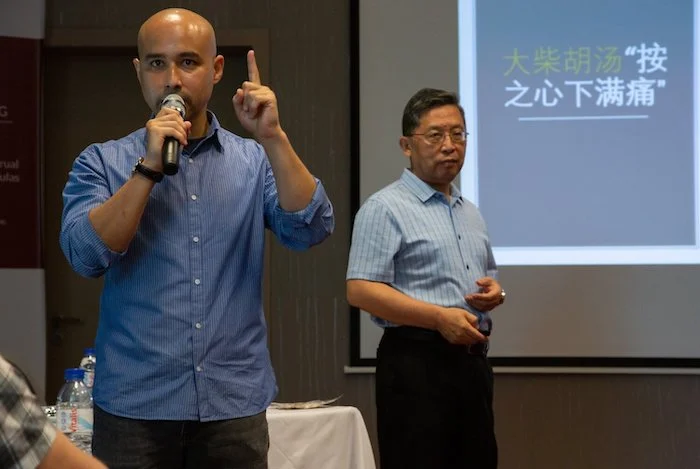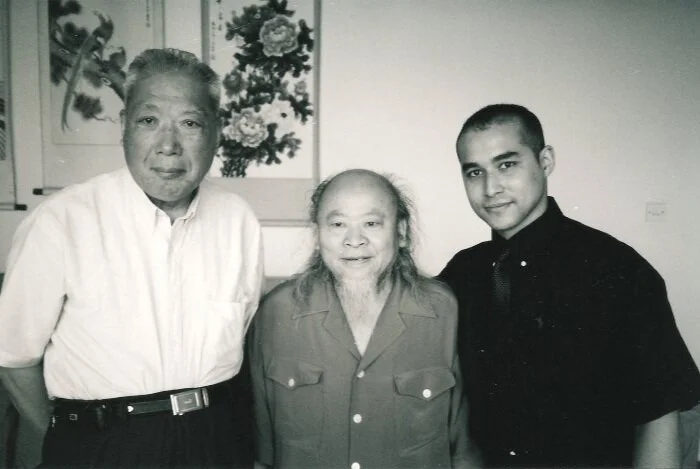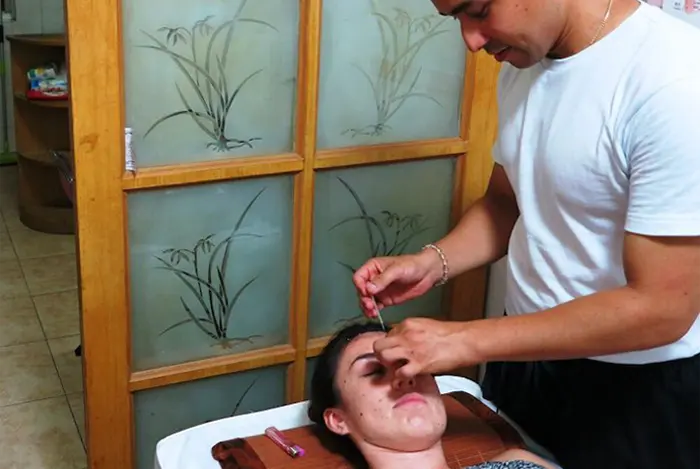In the West, Dr. Salustino Wong is one of the most prolific specialists of Classical Chinese Medicine, a school of thought that has been gaining ground in the modern academic world, staying true to the roots of ancient books.
Salustino left for China at the age of 22, after having met his first teacher in Cuba, his native land, who left him enchanted by the medicine in the country of his grandparents.
At the University of Chinese Medicine in Nanjing, he entered an academic career until completing his doctorate. Along his path, he met great Teachers and mentors with whom he maintains ties to this day, some examples are: Huang Huang 黃 煌, Zhao Ming Hua 趙鳴華 (ShanHanlun 傷寒 論), Yin Ming 殷 明 (Pediatrics), Wang Ning Sheng 王寧生 (Acupuncture), Tao Kun 陶 坤 (Acupuncture and Moxibustion), Zhang Ke Jian 張克儉 (Tui Na), Shan Zhao Wei 單 兆 偉 (Gastroenterology) , Tan Yong 谈 勇 (Gynecology), Xue Bin 薛 斌 ( Tai Ji Chuan), among others equally illustrious. During his time in China, Salustino immersed himself in Taoist, Buddhist, Confucian teachings, and the study of the art of calligraphy, embracing his passion for teas and the sacred instrument Gu Qin.
Salustino Wong meets Prof. Huang Huang in 1998, where he first comes into contact with the Jing Fang method and falls in love with its effectiveness and simplicity of prescription, within the in-depth study of classical Chinese medicine. He becomes his student, maintaining this connection to this day.
After several years of teaching in various European countries, the desire to remedy some defects in phytotherapy was born in Portugal, where Salustino began teaching in 2007. Currently, his teachings are present in Cuba, Peru, Italy, Estonia, France, Spain and Portugal.
A Latin Westerner motivated by Eastern and European culture, after 20 years in China and after having traveled paths where very few have been, Salustino becomes a rare and indispensable piece to understand the thought that is at the base of medicine. China, and how often it is enigmatic to Westerners.
Follow Us On…
Taiji Chen Hong Method in English:
https://www.facebook.com/chentaijihongmethod/
https://www.instagram.com/taijichenhongmethod/?utm_source=qr
Jing Fang Classics in English:
https://www.facebook.com/jingfangclassics.eng/
https://www.instagram.com/jingfangclassics.eng/?utm_source=qr
Jing Fang Classics in Spanish and Portuguese:
https://www.facebook.com/jingfangclassics/
https://www.instagram.com/jingfangclassics/?utm_source=qr
Salustinozwong Instagram:
https://instagram.com/salustinozwong?utm_source=qr
Frequently Asked Questions
What conditions can Chinese Medicine treat?
Chinese Medicine (CM) provides a comprehensive approach to healthcare, treating a myriad of conditions spanning from chronic pain to digestive ailments. It has been effectively used to manage respiratory and cardiovascular issues, and to balance reproductive health. Emotional and mental well-being are also areas where CM offers unique therapeutic insights. Additionally, practitioners often tackle skin conditions, headaches, and autoimmune disorders with CM strategies. Beyond treating existing issues, CM emphasizes preventive care, fostering overall health to preemptively counteract diseases. Its long-standing history and holistic approach make it a sought-after alternative or complement to Western medicine. It can be a supportive treatment for cancer as well.
Is Chinese herbal medicine safe?
When prescribed by a qualified practitioner, Chinese herbal medicine is safe. Chinese herbs have been used for thousands of years, with their safety and efficacy refined through generations of empirical observation and practice. When prescribed by qualified practitioners and used as directed, Chinese herbs are generally safe due to their natural composition and long-standing history of use. However, it’s essential to inform the practitioner of all medications and supplements you are taking to avoid potential interactions.
How long does a typical acupuncture session last?
An initial session may last up to 60 minutes, with subsequent sessions typically lasting 20-40 minutes.
Can children receive Chinese medicine treatments?
Yes, children can benefit from Chinese Medicine. Pediatric acupuncture and herbal remedies are often tailored to be gentler than those for adults. Chinese Medicine (CM) offers a holistic approach to pediatric care, addressing both the root causes and symptoms of childhood ailments. Its treatments are often natural and gentle, potentially presenting fewer side effects than some Western medications. Tailored to the individual needs of each child, CM ensures personalized care that can tackle unique health challenges. Beyond just addressing physical health, it also has the capacity to manage emotional and behavioral issues in children. With a multifaceted approach that includes techniques like acupuncture, herbal remedies, and pediatric massage, CM provides a comprehensive alternative for pediatric health.
Does acupuncture hurt?
Most patients report feeling minimal pain as the needles are inserted; some feel no pain at all. Once the needles are in place, there should be no significant discomfort.



